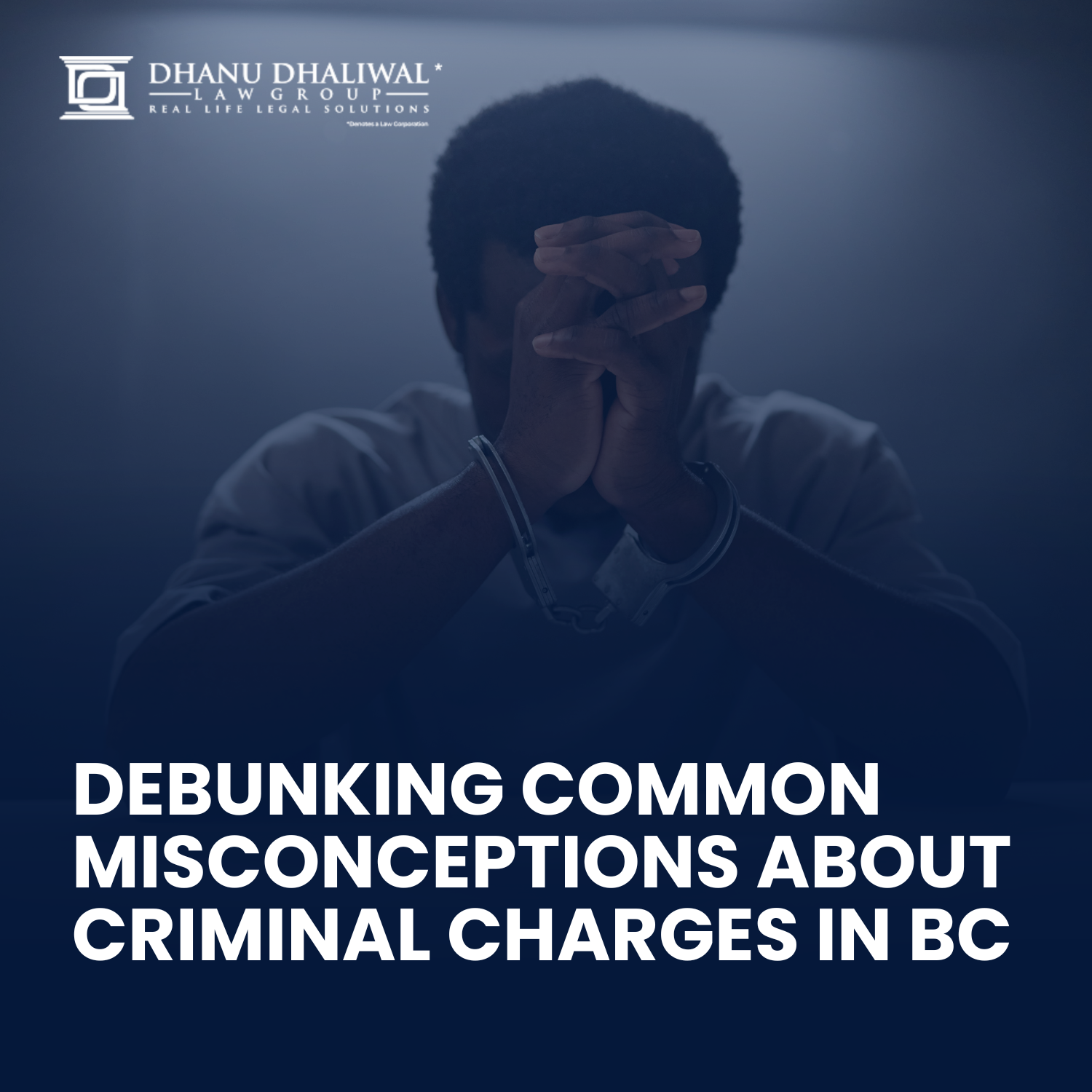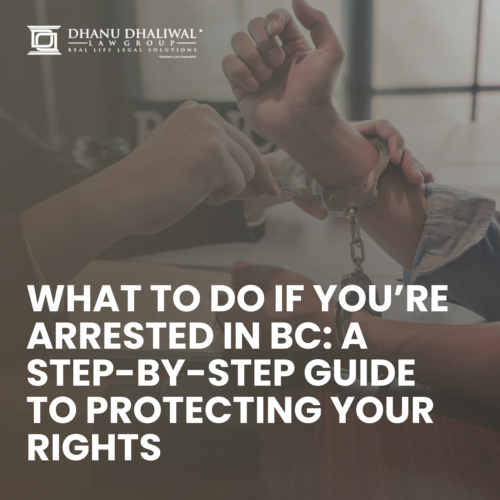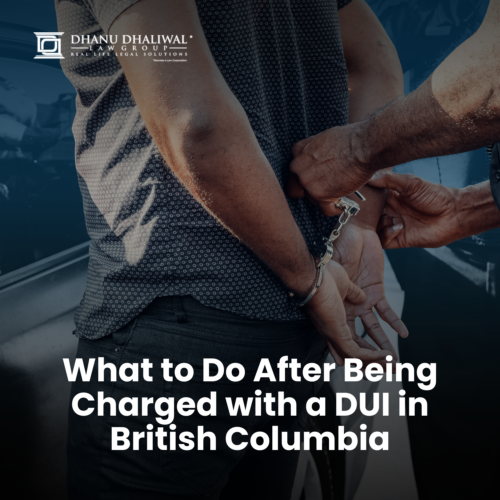Navigating the criminal justice system in British Columbia can be overwhelming, especially when common misconceptions cloud public understanding. Many individuals facing criminal charges in BC may base their decisions on myths that could hurt their case. In this post, we aim to debunk some of the most prevalent myths surrounding criminal charges and offer clarity on the legal process. Understanding the truth behind these misconceptions is crucial for anyone involved in a criminal case, as it ensures that decisions are made based on facts, not assumptions.
Myth 1: “If You’re Arrested, You’re Guilty.”
Reality:
Being arrested does not mean you are guilty. In Canada, individuals are presumed innocent until proven guilty. Arrest is simply the formal initiation of legal proceedings, and the burden of proof lies with the prosecution. The Crown must prove the defendant’s guilt beyond a reasonable doubt, and the accused does not have to prove their innocence.
An arrest may happen due to suspicion, but it’s not the same as being convicted. Even if you are arrested, it’s crucial to remember that a fair trial and legal defense can determine the outcome of your case.
Myth 2: “Police Can Enter Your Home Without a Warrant.”
Reality:
While it’s true that the police generally need a warrant to search or enter your home, there are specific exceptions. For example, police can enter your property without a warrant if they are in “hot pursuit” of a suspect or if they believe a crime is in progress. However, these exceptions are rare and come with strict legal criteria. For most situations, the police must obtain a warrant from the courts to enter and search your home.
Myth 3: “You Have the Same Rights as in the U.S.”
Reality:
Unlike the U.S. system, where suspects are read their “Miranda Rights,” the Canadian system operates under the Canadian Charter of Rights and Freedoms. Upon arrest, police must inform you of your right to remain silent and your right to consult a lawyer. These rights are crucial in protecting individuals from self-incrimination and ensuring they have access to legal counsel, but they are not identical to the rights in the U.S.
Myth 4: “The Insanity Defense is Commonly Used and Often Successful.”
Reality:
In Canada, the insanity defense is rarely used and even more rarely successful. While the legal term for this defense is “Not Criminally Responsible on Account of Mental Disorder” (NCRMD), it is only applicable in very specific situations where the accused was unable to understand the nature or quality of their actions at the time of the offense due to a severe mental illness. Contrary to what some believe, it is not a common or easy defense to invoke, and it is far from being a “get-out-of-jail-free card.”
Myth 5: “You Don’t Need a Lawyer If You’re Innocent.”
Reality:
Even if you believe you’re innocent, having a lawyer is essential when facing criminal charges. Legal professionals can help you understand the complex criminal justice system, protect your rights, and guide you through the legal process. A skilled defense lawyer can help gather evidence, challenge the prosecution’s case, and represent you in court, ensuring you receive a fair trial.
Myth 6: “All Criminal Charges Are Treated the Same.”
Reality:
Criminal charges vary significantly in terms of severity, consequences, and the legal processes involved. For instance, a simple theft charge is very different from a charge of assault or murder, not only in terms of penalties but also in how the case is handled by the courts. Factors such as the nature of the crime, the defendant’s history, and the circumstances surrounding the offense all influence the charges and their consequences.
Myth 7: “You Can Represent Yourself in Court Without Consequences.”
Reality:
While it is your right to represent yourself in court (self-representation), it’s not advisable, especially in criminal cases. Criminal law is highly complex, and the nuances of the legal process are difficult to navigate without proper training. Self-representing could lead to unfavorable outcomes due to lack of expertise, mismanagement of legal procedures, and inability to present a strong case. Having an experienced lawyer by your side can greatly increase the chances of achieving a positive result.
Myth 8: “If You Have a Clean Record, You Won’t Be Convicted.”
Reality:
Having a clean criminal record doesn’t guarantee that you’ll avoid conviction. While a previous record may influence sentencing, each criminal case is judged on its own merits. The evidence presented, the severity of the offense, and the defendant’s actions play a crucial role in determining the outcome of a case. Even first-time offenders can face serious consequences depending on the nature of the crime.
Myth 9: “Police Can Search Your Property Without Your Consent.”
Reality:
As with entering your home, police generally require a warrant to search your property. They may only conduct a search without consent under specific conditions, such as having reasonable grounds to believe evidence of a crime is present. Always remember that you have the right to refuse consent for a search if police do not have a warrant. However, it’s important to do so respectfully, and it’s always best to contact an attorney if you feel your rights are being violated.
Myth 10: “The Justice System Is Always Fair.”
Reality:
While the justice system in BC strives for fairness, it is not perfect. Mistakes can happen, and outcomes can sometimes be influenced by factors beyond just the law, such as the quality of representation, witness testimony, or media coverage. Having a dedicated and knowledgeable criminal defense lawyer ensures that your case is handled with the attention it deserves, giving you the best possible chance at a fair trial.
Conclusion
Understanding the truth behind these myths is crucial for anyone facing criminal charges in British Columbia. The criminal justice system can be complicated, and misinformation can cause unnecessary stress and confusion. If you or someone you know is facing criminal charges, it’s essential to consult with an experienced criminal defense lawyer who can provide expert legal guidance and support throughout the process.





